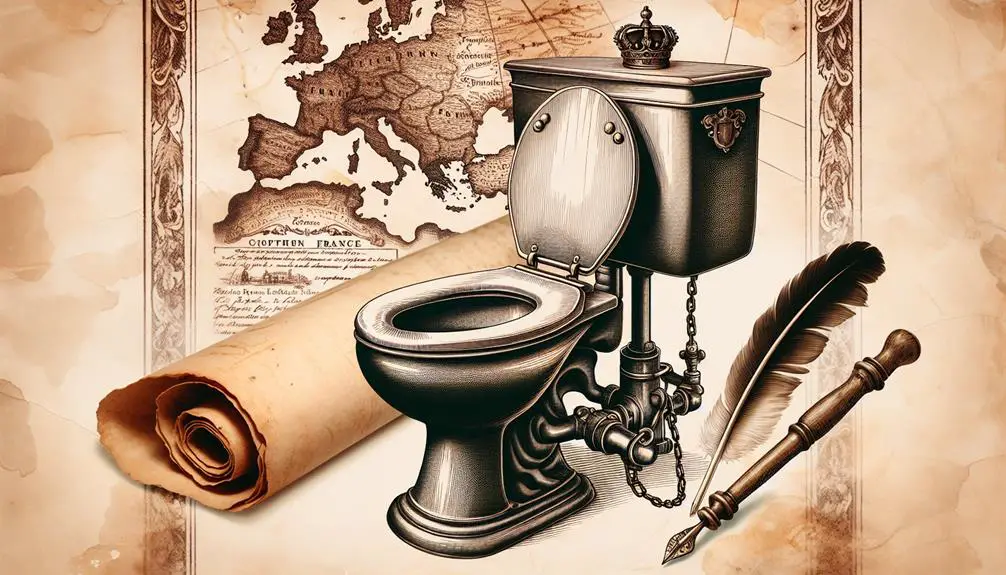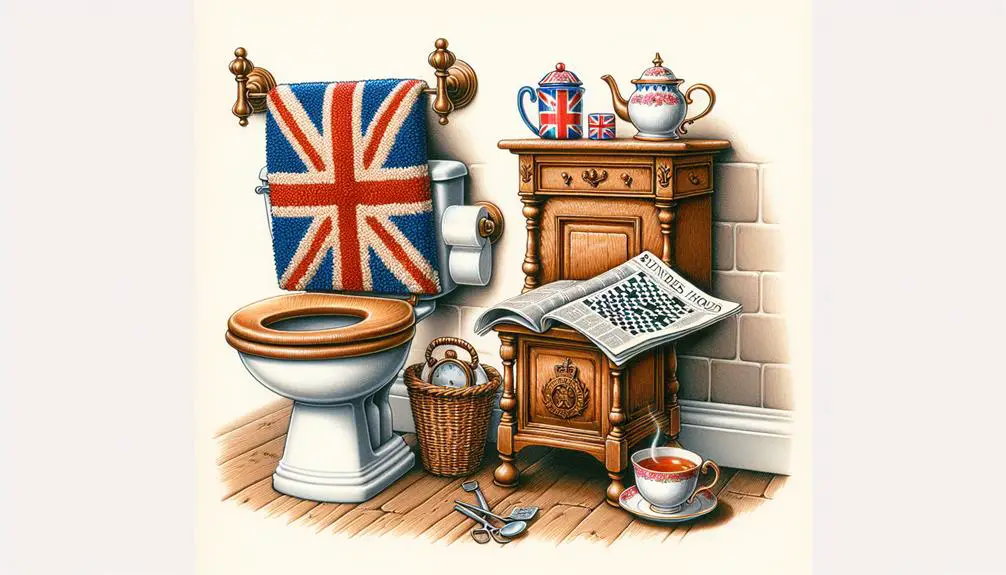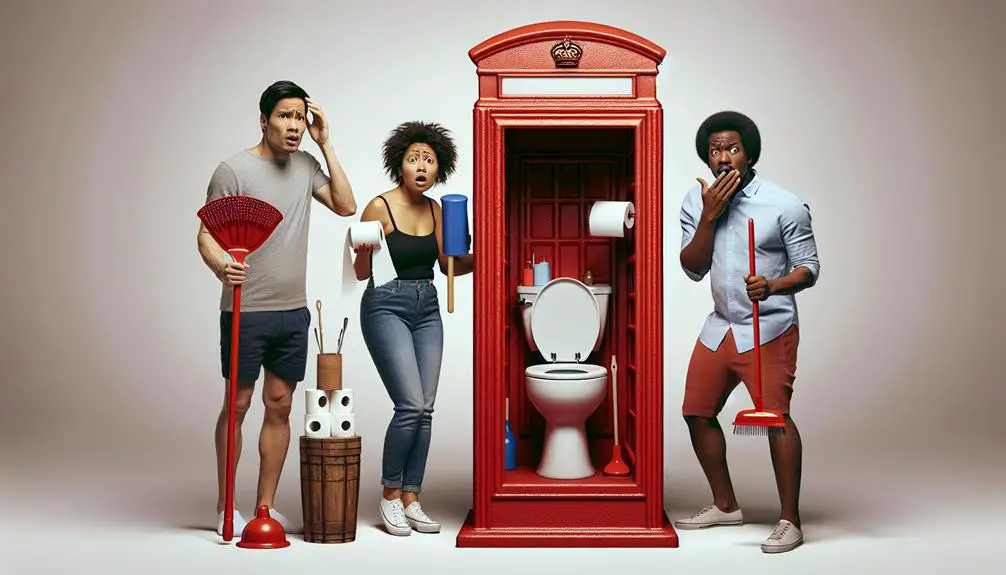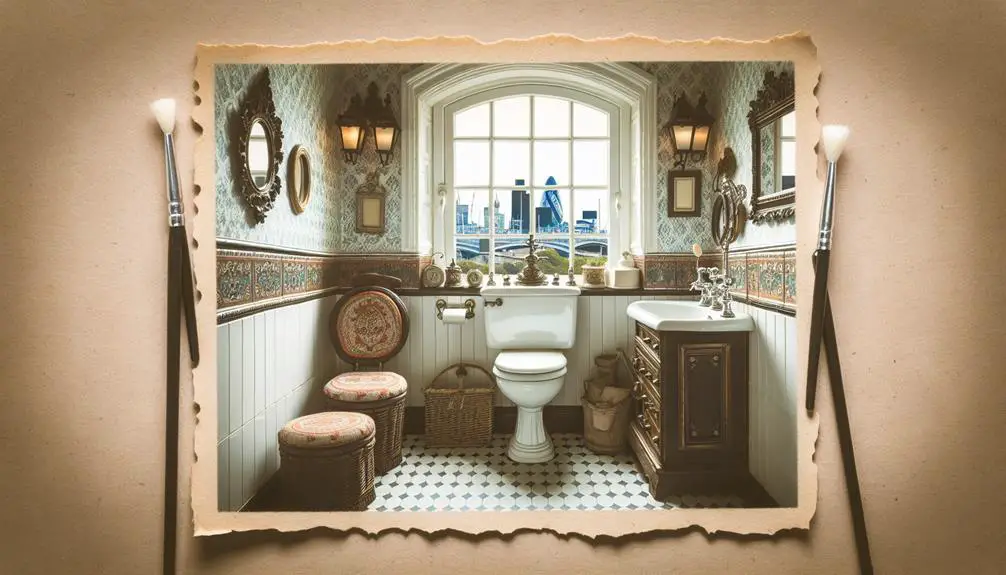Ah, the loo, Britain's crowning contribution to global culture, surpassing even Shakespeare and afternoon tea. You've likely stumbled across this term, chuckling at its quaintness, yet beneath its unassuming facade lies a rich tapestry of history and cultural nuance.
From its murky origins to its omnipresence in British English, the story of 'loo' is not just about a word, but about the people and the peculiarities of language evolution. As you explore further, you'll find yourself navigating through a fascinating maze of etymology, cultural significance, and even its unexpected appearances in popular media.
Why does this seemingly trivial term merit a closer look? The answer lies in the unexpected depths beneath its surface.
Origins of 'Loo

The origins of the term 'loo' are often debated among linguists, yet several plausible theories have emerged. You might find it intriguing that amidst these debates, a common ground remains elusive. Each theory you encounter sheds light on different aspects of British culture, and together, they weave a complex narrative about the evolution of language.
One prominent theory suggests that 'loo' derives from the nautical term 'lee' or 'leeward'. This connection isn't immediately obvious, but upon closer examination, you'll see it hinges on the concept of directionality in disposing of waste at sea. This theory posits that the adaptation of 'lee' to 'loo' in British slang was a linguistic evolution influenced by sailors' practices.
Another theory you'd likely find fascinating involves the French phrase 'gardyloo,' which is believed to have been shouted in Edinburgh as a warning before waste was thrown from the windows onto the streets below. This theory suggests that 'loo' found its way into the English language through a process of linguistic borrowing and adaptation, reflecting the fluid nature of language transfer between cultures.
As you delve into these theories, you're encouraged to consider how each proposition reflects broader linguistic principles, such as language contact, borrowing, and the socio-cultural factors influencing language change. It's essential to approach these theories with a critical eye, recognizing that the true origin of 'loo' may remain a matter of speculation. However, the exploration of its possible sources offers valuable insights into the dynamics of language evolution.
Etymology Explored
Delving deeper into the etymology of 'loo,' you'll find that linguistic evidence sheds light on its complex journey through history and culture. The term's origins aren't definitively traced to a single source, underscoring its intricate evolution within the English lexicon. Scholars suggest multiple theories, each offering a distinct perspective on how 'loo' came to signify the bathroom in British English.
One prevailing theory posits that 'loo' derives from the French phrase 'gardyloo,' a corruption of 'gardez l'eau.' Traditionally shouted in Edinburgh as a warning before discarding waste water from windows, this phrase's phonetic similarity to 'loo' is undeniable. However, linguistic analyses reveal a gap between the phrase's decline in use and the emergence of 'loo' in English, suggesting an indirect influence at best.
Another hypothesis links 'loo' to nautical language, specifically the term 'lee' or 'loo,' referring to the sheltered side of a ship. This connection implies a metaphorical transition from a place of refuge to a private space for personal relief, aligning with the term's current connotation. Yet, this theory, while intriguing, lacks substantial documentary evidence to confirm its validity.
A third consideration involves the adaptation of 'loo' from the Romani word 'lavo,' meaning 'wash.' Romani influence on English slang is well-documented, making this a plausible route for 'loo's etymological journey. However, like other theories, direct evidence supporting this pathway remains elusive.
In analyzing 'loo's etymology, you're confronted with a mosaic of potential origins. Each theory contributes to understanding its linguistic adaptation, underscoring the term's rich tapestry within British cultural lexicon.
Usage in British English

Frequently, in British English, 'loo' is colloquially used to refer to the bathroom, illustrating its widespread adoption and integration into everyday language. You'll find its usage permeates various contexts, from casual conversations among friends to more formal settings, albeit less commonly in the latter. The term's versatility and unpretentious nature make it a staple in the lexicon of British English, serving as a testament to its enduring relevance.
To understand its prevalence, consider the following points:
- Ubiquity in Media: 'Loo' frequently appears in British literature, television, and film, reflecting and reinforcing its commonplace status in spoken English. This media presence not only mirrors its everyday use but also aids in disseminating the term across different regions and demographics within the UK.
- Variations in Usage: Despite its widespread use, the term 'loo' can denote slight variations in meaning depending on the context. It might refer to a public toilet in one instance and a private bathroom in another, highlighting its flexibility.
- Social Acceptability: 'Loo' strikes a balance between being informal enough for casual use yet not so colloquial that it's deemed inappropriate in more refined contexts. This delicate balance contributes to its widespread acceptance.
- Educational Settings: Even in educational contexts, 'loo' is used to instruct children on polite terms for the bathroom, indicating its perceived propriety and suitability for all ages.
Analyzing the term 'loo' within British English reveals not just a word for a bathroom but a linguistic phenomenon that encapsulates cultural nuances, social dynamics, and the evolution of language in everyday life.
Cultural Significance
Exploring the term 'loo' further reveals its deep cultural significance within British society, reflecting broader social attitudes and historical developments. You'll find that the term encapsulates more than just a colloquial reference to a restroom; it embodies a tapestry of British humor, politeness, and a unique approach to euphemism. This reliance on euphemism, particularly for private or potentially embarrassing subjects, highlights a quintessential aspect of British culture: the preference for understatement and modesty. The term 'loo' serves not just as a linguistic artifact but as a window into the collective British psyche, illustrating how language evolves to soften the edges of everyday life.
Moreover, the prevalence of 'loo' in British English underscores the social dynamics and class consciousness that pervade UK society. Historically, language in Britain has been a marker of social status and education. In this context, the use of 'loo,' as opposed to more formal or crude alternatives, can signal a person's social standing or their attempt to align with certain class-associated manners. The term thus operates within a complex social lattice, subtly communicating information about the speaker's identity and cultural affiliations.
Your understanding of 'loo' and its cultural significance provides insight into the intricate relationship between language, society, and identity in Britain. It's not merely a word but a reflection of societal norms, historical shifts, and the ongoing dance of cultural expression. This exploration into the term 'loo' exemplifies how even the most mundane elements of language can be imbued with deep cultural resonance.
Variations and Misconceptions

While the term 'loo' is widely recognized across the UK, various regions and social circles have developed their own nuanced variations and, at times, misconceptions surrounding its use. You might find yourself puzzled or even inadvertently amusing your British friends with an improper use of the term. To navigate these linguistic nuances, it's essential to understand both the variations and the common misconceptions.
- Regional Variations: Depending on where you're in the UK, you might hear 'lav', 'bog', or 'netty' instead of 'loo'. Each term carries its own cultural and historical connotations.
- Class Misconceptions: There's a misconception that 'loo' is used solely by the upper class, while other terms are more proletarian. However, 'loo' transcends class boundaries more than many realize.
- Formality Levels: While 'loo' is informal, it's mistakenly believed to be inappropriate or too casual for certain settings. In reality, its use is broadly accepted in most social situations.
- Etymological Myths: Many believe 'loo' derives from the French 'gardez l'eau,' meaning 'watch out for the water,' supposedly shouted before chamber pots were emptied. This etymology is widely disputed among linguists.
Understanding these nuances and misconceptions is crucial for anyone looking to master the subtleties of British slang. By recognizing the variations and dispelling the myths, you'll not only enrich your vocabulary but also deepen your appreciation for the complexity and vibrancy of regional dialects within the UK. Remember, language is a living entity, constantly evolving with society.
Loo' in Popular Media
Having established the nuanced variations and common misconceptions surrounding the term 'loo,' it's crucial to examine its portrayal and influence in popular media. You'll find that British television series, films, and literature often use 'loo' not just as a colloquial term for the bathroom but as a cultural marker that subtly conveys a sense of place and identity. This usage serves to immediately locate a scene or character within a British context, leveraging the audience's familiarity with British slang to build authenticity.
Moreover, the term 'loo' in popular media does more than just signal Britishness; it often carries connotations of informality and comfort. When characters use 'loo' instead of more formal alternatives, it typically suggests a level of intimacy or casualness in their interactions. This linguistic choice can thus subtly influence viewers' perceptions of characters and their relationships, making them seem more relatable or down-to-earth.
However, it's important to note that the representation of 'loo' varies across different genres and media forms. In comedy, for instance, 'loo' might be employed for humorous effect, playing on British stereotypes or the incongruities of everyday life. In drama, its use might instead underscore character development or plot points, providing insights into social norms and behaviors.
Analyzing the use of 'loo' in popular media, therefore, offers a window into the complexities of British culture and identity. It highlights how a simple term can encapsulate and convey a rich tapestry of social meanings, reflecting and shaping the audience's understanding of Britishness.
Frequently Asked Questions
How Can Non-Native Speakers Best Integrate the Word 'Loo' Into Their Everyday Conversation Without Sounding Forced or Unnatural?
To seamlessly incorporate 'loo' into your vocabulary, listen to native speakers and mimic their usage. Practice by substituting 'bathroom' or 'restroom' with 'loo' in casual conversations. It'll soon feel natural and unforced.
Are There Any Notable Differences in the Reaction or Perception When Tourists or Foreigners Use the Slang 'Loo' in the UK, Compared to Locals?
When you, as a tourist or foreigner, use the term "loo" in the UK, locals may perceive it differently, often finding it endearing or amusing, unlike when a local uses the same term.
What Are Some Humorous or Embarrassing Misunderstandings That Have Occurred Due to the Use of the Slang 'Loo' by Those Unfamiliar With British English?
You might've heard tales where non-Brits, attempting to use "loo" correctly, end up in hilarious mix-ups, asking for a "book loo" instead of a bookstore, or a "loo break" during a serious meeting.
How Do British English Speakers React to the Use of More Americanized Terms for Bathroom/Restroom in Place of 'Loo', Especially in Formal Settings?
In formal settings, British English speakers often find American terms like "restroom" amusing or out of place. They're accustomed to "loo," so "bathroom" in a public setting might elicit a raised eyebrow or chuckle.
Can the Use of the Term 'Loo' in Professional or Academic Environments in the UK Be Considered Appropriate, or Is It Strictly Informal?
You'll find that in the UK, using 'loo' in professional or academic settings isn't strictly informal, but it's more appropriate to use 'toilet' or 'restroom' to maintain a higher level of formality.
Conclusion
As you've delved into the intricate history and cultural significance of 'loo,' it's clear that this term is more than mere British slang. Its etymology, shrouded in mystery, invites further exploration.
Each usage and mention in popular media adds layers to its story, challenging preconceived notions. But what's truly fascinating is how 'loo' continues to evolve, reflecting societal changes.
So, as you ponder the origins and transformations of this ubiquitous term, remember, the journey into the depths of language is never quite finished.







